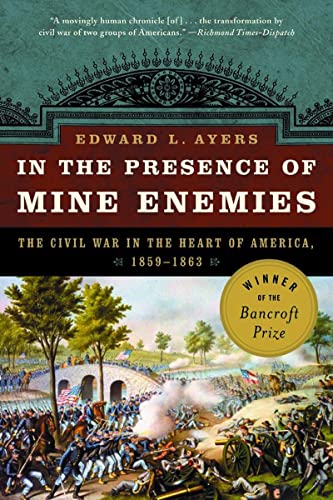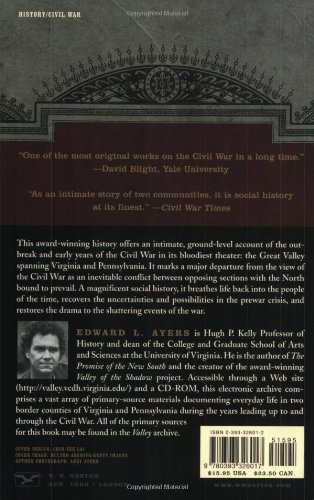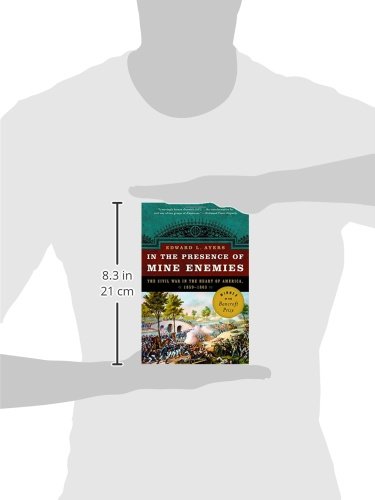Customer Services
Copyright © 2025 Desertcart Holdings Limited




Full description not available
B**K
Very Good Social History
In the summer of 1859 the Great Valley that included parts of Pennsylvania and Virginia was filled with great prosperity. Two counties in the great valley, Franklin in PA and Augusta in VA, had bright futures, crops were growing well, people could make a living with a little hard work and times were good. Both counties in the Great Valley were similar in landscape and agriculture. Augusta, unlike the Deep South, grew corn, wheat and grains as the major crops, but like all southern areas held slaves. Franklin County was similar in most aspects except it was more populated and of course held no slaves. It seemed like the sky was the limit for the potential of the young nation as a whole, however, their lingered strong feelings over sectional debates dealing with slavery and the interpretation of the constitution between the North and the South. The citizens that lived in these counties along the Mason-Dixon Line thought that conflict had to be resolved in order to maintain a strong Union. People along the border had a strong feeling that life would be better with compromise and Union than the brutal consequences of life without."In the presence of Mine Enemies: The Civil War in the Heart of America, 1859-1863 by Edward L. Ayers is a social history of life in these two counties in the border states. The centers for population and transportation in each county were Chambersburg in PA and Staunton in VA, much of the story takes place in these towns. Ayers uses accounts in the local papers as well as letters and diaries of the citizens of the Franklin and Augusta to tell the story of what life would be like there. The story starts out with the 4th of July celebrations in each county and ends just prior to the Battle of Gettysburg. The book is broken down into four sections following the twenty-third psalm along the lines that both sides held strong religious beliefs.Partisan politics played an important role in the lives of individuals in the counties of the sectional border. In the late summer of 1859 the famous abolitionist Frederick Douglas came to Chambersburg to speak. After the speaking engagement he actually met with another famous abolitionist John Brown at a quarry outside of town. John Brown tried to talk Douglas into joining his group to raid Harpers Ferry. Douglas declined and advised Brown to do otherwise. After John Browns raid the fallout drew heavy criticism from both Augusta and Franklin. The Democratic papers in Franklin along with the papers in the south blamed the abolitionist Republicans for creating people such as John Brown. This political turmoil continued to get worse until it all broke loose with the election of Lincoln. Alexander McClure a resident of Chambersburg was elected to the Senate at the same time and he was a major factor in helping Lincoln carry Pennsylvania. Interesting enough Alexander McClure is the same guy who began publishing the Juniata Sentinel in my hometown, I get that paper each week! McClure would become a senator and an important part of the Lincoln administration.Soon after the election of Lincoln the people of Augusta sent a few representatives to the state convention, former whigs such as George Baylor and John Baldwin gave great speeches trying to save the Union. The convention voted not to secede and you could sense a sigh of relief in the people of Augusta. This relief was short lived however with the attack on Fort Sumter and subsequent calling up of troops by Lincoln. The change in the people of Virginia was drastic and swift the state virtually seceded overnight. The people of Augusta felt lied to and betrayed by Lincoln and their support for the Confederacy was very strong. The people of Augusta developed a "war fever" as they began recruiting troops for an invasion by Lincoln's army. Large numbers of men joined the Confederate army eager to fight and the women began sewing uniforms for the soldiers. John Imboden joined the army and started a large Guerilla unit under the direction of Stonewall Jackson. Will Baylor and Jed Hotchkiss also from Augusta signed up as well. Will Baylor went on to become a captain in the infamous "Stonewall Brigade", he was killed at the 2nd Bull Run and Jed became a map maker for General Jackson and General Lee helping them secure many victories early in the war.During this same time the people of Franklin could not believe their neighbors to the south seceded and the war fever broke out there as well. Soldiers began massing with 5 regiments in Camp Slifer to the south of Chambersburg. It cannot be underestimated how eager both sides were to fight and how they underestimated the strength of the other side. People in Franklin joked about how short the war would be, they that one or two battles would be all that was necessary to put down the rebellion and restore order to the Country.The start of the war brought the Battle of Bull Run, the resulting Confederate victory gave the citizens of Augusta great encouragement and the people of Franklin great despair. The democratic papers of Franklin County criticized Lincoln's army and said they were fighting for the wrong reasons; the Republicans in turn blamed the Democrats for Treason. The lull in the major action in late 1861 gave both sides time to think about what this war might become, but both sides believed that God was on their side.With most of their men in the army and many Union troops massing in the Northern Shenandoah Valley and North of Richmond the people of Augusta began feeling insecure. Things were looking very bleak in the winter of 1861, while the men from Augusta were only 30 miles from home they were camped out in the Alleghany Mountains. The letters that the men wrote home told of the poor conditions and how they wished to be home. In these letters men described sickness and anticipation of a fight, the soldiers resented those men still at home and thought them cowards for not joining the army. At the same time these soldiers families were struggling to make ends meet at home. In the spring of 1862 the men in the mountains wrote that they were moving toward Richmond and families began to worry. To their surprise however Jackson marched the troops onto trains and shipped them all to Staunton. The people were very excited but noted that the troops looked very ragged and beat. Although they rested a short time in Staunton General Jackson's troops began marching at a swift pace up the Shenandoah Valley. Jackson put together a large string to victories in the valley ending at Winchester. During the same stretch of time Lee booted McCllelan away from Richmond in the 7 days Battle. Meanwhile back in Staunton the hospitals and graveyards were filling up with dead Confederate soldiers, some of them family members of the people in Augusta.Lee and Jackson's forces joined at 2nd Bull Run and gave the South another victory. The forces then moved on to the bloodiest battle in the war, Antietam, a Union victory and with it came the Emancipation Proclamation by Lincoln. The people of Franklin County were thrilled to have a victory but wondered how close the Confederates had come to an invasion of Pennsylvania. Partisan politics once again took center stage, while the democratic papers of Franklin showed excitement at the Union victory at Antietam; they displayed disgust at the proclamation by Lincoln. The upcoming local and state elections in the North would prove that the Democrats were well liked in Pennsylvania with many positions taken by them. It was a different situation in the South, they no longer had a party system, it was everyone together against the North. The people of Augusta saw the Emancipation Proclamation as a Tyrannical move by Lincoln that affirmed their fears of a "race" war. Before the elections of 1862, J.E.B. Stuart made a raid into Chambersburg with his 1200 cavalry. This first Confederate raid into Chambersburg accomplished little except to show how slow McClellan's army was and gain lots of newspaper coverage. The people of Chambersburg could do nothing as no military men were stationed in the town at the time.Another important victory for the Confederates came in the winter of 1862 at Fredricksburg. This demoralized the Union soldiers but more importantly it demoralized the people at home. The copperheads became more involved in politics in Franklin County, and with democratic victory in the elections it looked as if the North might divide itself. The South would have a great chance for a stop to the war and peace if the Republican party lost control. However, one Augusta resident, Joseph Waddell, wrote in his diary that "while there is growing discontent in the North, it will only take a major victory, especially the capture of Vicksburg to unite the North again." And while the South was happy with the victories and growing Northern discontent the truth was that the economy of the North was much better off than those of the South. The people living in Chambersburg had a bountiful harvest in the fall of 1862; those farms of Northern Virginia had been decimated by both armies living off the land. With all of this going on the spring the Army of Northern Virginia was going hungry and living in poor conditions. One soldier wrote that "in the morning we had beef steak, for lunch roast beef, and for dinner what was left from breakfast." With these dire conditions it is easy to see why Lee would want to live off the land and push on into Pennsylvania where the harvests were bountiful. This book ends with the Confederates raiding Chambersburg for a second time. While the people noted the chivalry of the soldiers, they were appalled at their treatment of the black population. While in Chambersburg the orders came through that major fighting was happening at Gettysburg and all forces should move there.This book by Ayers is a look into what life may have been like living in Civil War times. The emotional rollercoaster must have been difficult for many people to handle when times were so good years prior to the conflict. This book is very well researched with material from both counties however, there is much more material here for the southern side. The southern material uses newspapers but also has a lot of letters and diaries of the citizens of Augusta. The northern material consists of mainly partisan newspapers, but shows the political turmoil of the North rather well. These papers were even more partisan than Fox News or CNN, and they did not even try to hide that fact. Both instances give a great feeling of what the citizens were dealing with on both sides. I would read this book again and will read the next book in the series when it comes out. The next book should pick up at Gettysburg and continue until reconstruction. I would recommend this book to anyone taking a Civil War class specifically those students in the Franklin or Augusta County area.
C**S
Brilliantly conceived. Thoughtfully executed.
Part social history, part war chronicle, part social commentary all bound together by the luminous narrative of Edward L. Ayers. “In the Presence of Mine Enemies: The Civil War in the Heart of America, 1851-1859” is a brilliantly conceived and expertly told story of the Civil War, specifically through the eyes of the citizens who lived in Franklin County, Pennsylvania and Augusta County, Virginia.The premise of this history is simple: how did the issue of slavery and the threatened dislocation of a Civil War impact 2 communities, one in the North and the other in the South. Using primary sources that have been carefully collected and preserved by historians in The Valley of the Shadow Project, Professor Ayers ingeniously views the Civil War through the eyes of Unionists, Confederates, Copperheads, Republicans, Democrats, Slaves, soldiers, plantation owners, the poor, widows, shopkeepers, politicians, and Presidents.The depth of perspective that can be gained from such an intimate view of the war is stunning. Reading Ayers’ book becomes an empathic enterprise. History lives through those who lived that history. And the impact is at once emotional and enlightening. Ayers ability to tell a story is partly due to his command of facts on the ground but also throw his command of the English language. Ayers’ prose simply shines as his fast-paced narrative floats effervescently page after page.Ayers reminds us how war affects people, how it destroys parts of society even as it seeks to transform the status quo. This thoughtful book is a welcome edition to the Civil War library of anyone who wishes to think deeply of the war’s impact on people, on States, on Nations and on ways of life. This book will taken you in on the first page and will not let you go until the end, until you realize that the books ends at Chancellorsville on the eve of Gettysburg. And then, like me, you will begin to read volume 2 entitled “The Thin Light of Freedom.” I would write more but my book is waiting. Happy reading!
Trustpilot
3 weeks ago
1 month ago